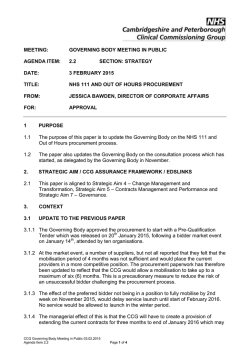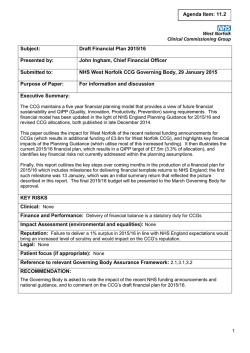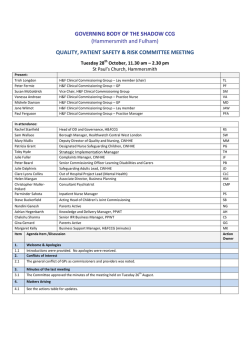
southampton local plan for the better care fund : pooled fund
DECISION-MAKER: HEALTH AND WELLBEING BOARD SUBJECT: SOUTHAMPTON LOCAL PLAN FOR THE BETTER CARE FUND : POOLED FUND DEVELOPMENT DATE OF DECISION: 28TH JANUARY 2015 REPORT OF: DIRECTOR OF QUALITY AND INTEGRATION, INTEGRATED COMMISSIONING UNIT CONTACT DETAILS AUTHOR: Name: Donna Chapman Tel: 023 80296004 E-mail: [email protected] Director Name: Alison Elliott John Richards Tel: 023 80 832602 023 80 296923 E-mail: [email protected] [email protected] STATEMENT OF CONFIDENTIALITY None BRIEF SUMMARY In the statement on the next comprehensive spending review made in summer of 2013 the Chancellor of the Exchequer announced that nationally a sum of £3.8 billion would be set aside for 2015/16 to ensure closer integration between health and social care. This funding was described as “a single pooled budget for health and social care services to work more closely together in local areas, based on a plan agreed between the NHS and Local Authorities”. Local Authorities and the Clinical Commissioning Groups (CCGs) operating in their area were required to submit a plan setting out how the pooled funding will be used to improve outcomes for patients, drive closer integration and identify the ways in which the national and local targets will be met. Over the last 12 months extensive work has been undertaken by the City Council working in partnership with Southampton City CCG and other stakeholders to develop Southampton's Better Care Plan, under the leadership of the Health and Wellbeing Board. The final plan was signed off by the Health and Wellbeing Board, Chief Executive of the City Council and Chief Operating Officer of the CCG on 19 September 2014 and submitted to Ministers. This has been recently approved following the Nationally Consistent Assurance Review which identified no areas of high risk within the plan and means that Southampton can now progress its plan with establishment of a Better Care pooled fund by 1 April 2015. Southampton is one of ten authorities nationally with the ambition to integrate and pool resources at scale to significantly transform its health and care services. The Better Care Fund (BCF) requires a minimum contribution of £15.325m revenue funds plus £1.526m capital to a pooled fund. Southampton City's plan is to go far beyond this and pool over £132m, nearly 9 times more than the minimum requirement. The split between the forecast contributions is currently 57% CCG and 43% City Council. 1 RECOMMENDATIONS : (i) To support the request that the Council and CCG Governing Body approve entering into a S75 of the National Health Service Act 2006 Partnership Agreement pooled fund, noting the minimum statutory requirement to pool £15.325m revenue and £1.526m capital. (ii) To support the request that the Council and CCG Governing Body approve exceeding the minimum requirement to pool up to the total value of the first 3 schemes identified in Section 13 of this report (Cluster development, Supporting carers and Integrated discharge, reablement and rehabilitation) from 1 April 2015, noting Southampton’s ambition to achieve integration at scale at a total cost of approximately £61m. (iii) To support the request that the Council and CCG Governing Body approve the addition of the remaining budgets included within Section 13 of this report into the pooled fund as and when appropriate, bringing the total value to approximately £132m. REASONS FOR REPORT RECOMMENDATIONS 1. From 1 April 2015 Local Authorities and CCGs are required to establish a pooled fund under Section 75 of the NHS Act 2006 for health and social care services to work more closely together in local areas, based on a plan agreed between the NHS and local authority. For Southampton City the minimum value of the pooled fund is £15.325m revenue and £1.526m capital. 2. Southampton City has taken a more holistic approach to health and social care and proposes to fund and commission it in that way. The ambition is to encompass all services that fit within the scope of the Better Care model, bringing together approximately £132m into the pooled fund. ALTERNATIVE OPTIONS CONSIDERED AND REJECTED 3. Not to establish a pooled fund - this is not an option as Local Authorities and CCGs are required to establish a pooled fund for the minimum £15.325m revenue and £1.526m capital by 1 April 2015 4. To pool only the minimum - this has been rejected on the basis that Southampton's Better Care Plan, which has been signed off by the Health and Wellbeing Board, seeks to achieve a fully integrated model of health and social care. In order to achieve this ambitious transformation, it is considered necessary to bring together all of those health and social care resources associated with this vision and commission services in a fully integrated way, which is focussed on people's outcomes and needs in their entirety, as opposed to their health or social care in isolation. 5. To pool all of the health and social care resources for those services within the scope of the Better Care model from 1 April 2015 - this has been rejected in favour of a more gradual progression towards this aim which allows each scheme to be fully scoped and tested before adding it to the pooled fund. Three of the five schemes have been worked up in significant detail and are ready for inclusion from 1 April 2015. 2 DETAIL (Including consultation carried out) 6. The Southampton Better Care Plan is attached at Appendix 1. The details of the plan are not re-iterated in this covering report, as the plan is a detailed stand-alone document. 7. Summary of Plan Southampton's vision for Better Care is to completely transform the delivery of care in Southampton so that it is better integrated across health and social care, delivered as locally as possible and person centred. People will be at the heart of their care, fully engaged and supported where necessary by high quality integrated local and connected communities of services to maintain or retain their independence, health and wellbeing. Neighbourhoods and local communities will have a recognised and valued role in supporting people and there will be a much stronger focus on prevention and early intervention. The overall aims are: • Putting people at the centre of their care, meeting needs in a holistic way. • Providing the right care, in the right place at the right time, and enabling people to stay in their own homes for as long as possible. • Making optimum use of the health and care resources available in the community, reducing duplication and closing gaps, doing things once wherever appropriate. • Intervening earlier in order to secure better outcomes by providing more coordinated, proactive services. Underpinning these aims are the following national conditions: • Protecting social care services. • Seven day services to support discharge from hospital. • Data sharing. • Joint assessment and accountable lead professional for high risk populations. Southampton's plan has the following main schemes: 1. Local person centred coordinated care (clusters) - integrated multidisciplinary cluster teams providing integrated risk stratification, care coordination, planning, 7 day working. 2. Integrated discharge, reablement and rehabilitation service, including greater use of telecare/telehealth. This scheme is aimed at helping people to maintain their independence at home, in the community, intervening quickly where required to prevent deterioration, as well as supporting people’s recovery and reablement following a period of illness 3. Community solutions and prevention - this scheme is aimed at building on and developing local community assets and supporting people and families to find their own solutions. 4. Supporting carers – this scheme recognises the important role that carers have in supporting older people and those with multiple long term conditions in the community and supports the overall model and ambitions of local person centred coordinated care. 5. Developing the market for placements and packages and further integrating approaches – this includes work to develop the market to 8. 3 9. 10. provide greater opportunity and choice, encourage a recovery/ reablement focus and support people to remain as independent as they can be in their own homes. Southampton’s Better Care Plan has been designed to achieve the following key targets: • To reduce unplanned hospital admissions - by 2% year on year over the next 5 years (2014 – 2019). • To reduce permanent admissions to residential and nursing homes - by 12.3% in per capita terms over 2014/15 and sustain and improve on this in subsequent years, bringing Southampton in line first with its statistical neighbours and then the national average. • To reduce readmissions by increasing the percentage of older people still at home 91 days post discharge into reablement services - to achieve 90% in 2015/16. • To reduce delayed transfers of care and therefore excess bed days - by 3 per day in 15/16 which equates to an approximate 10% reduction. • To reduce injuries due to falls - by 12.5% by the end of 2014/15 and sustain and improve on this in subsequent years. Consultation Engagement with local providers has been an important aspect of the Local plan development. Providers, along with community, voluntary sector and public representatives have contributed to the shared view of the future shape of services. Three large stakeholder workshops were held on 16 November 2013, 12 December 2013 and 17 January 2014 and involved a wide range of stakeholders from all of the local health providers, primary care, voluntary sector groups, local councillors and City Council housing and social care. Since then the Integrated Care Board which brings together senior operational and clinical leaders from the CCG, City Council, provider NHS Trusts and voluntary sector has been overseeing the development of the plan, with regular updates to the Health and Wellbeing Board. There has been ongoing engagement and consultation in cluster areas. Extensive engagement with patients/service users and the public has also taken place and included: • A range of service user focus groups including the CCG Patients Forum, Older Persons Forum focus group, Pensioners Forum • Equality Reference group • Healthwatch • Carers Strategic group 4 11. Development of the pooled fund - core principles What is a pooled fund? Section 75 of the NHS Act (2006) allows the pooling of funds where payments may be made towards expenditure incurred in the exercise of any NHS or ‘health-related’ local authority functions. Section 75 also allows for one partner to take the lead in commissioning services on behalf of the other (lead commissioning) and for partners to combine resources, staff and management structures to help integrate service provision (integrated management or provision), commonly known as ‘Health Act flexibilities’. A pooled budget (or fund) is an arrangement where two or more partners make financial contributions to a single fund to achieve specified and mutually agreed aims. It is a single budget, managed by a single host organisation with a formal partnership or joint funding agreement that sets out aims, accountabilities, responsibilities, governance and technical aspects including financial reporting, management of risks, exit strategy, and treatment of overspends. Detailed guidance is attached at Appendix 2. Benefits of a pooled fund Southampton City's Better Care Fund Plan seeks to pool all budgets associated with health and social care services for older people and those with long term conditions to deliver a fully integrated provision centres on the needs of individuals. Pooling these budgets at scale will: Minimise overlap/gaps in service delivery, increase efficiency, improve value for money and ensure that services are designed to meet the needs of service users. Enable faster shared decision making, effective use of resources and economies scale. Enable radical redesign of services around the user regardless of whether their needs are mainly social or health. Enable greater transparency of spend – governance of a pooled fund requires all budgets to be clearly identified and monitored by both partners. Provide greater flexibility to move resources quickly to where they are required to meet need. The Integrated Commissioning Board (ICB) of the City Council and CCG which oversees all integrated commissioning arrangements between the two organisations has been overseeing the development of the pooled fund, in consultation with City Council and CCG legal representatives and finance. The Board comprises the Cabinet Member for Adult Health and Social Care/Chair of the HWB Board, the Clinical Chair of the CCG, the Chief Executive of the City Council, the Chief Operating Officer of the CCG, the Director of Public Health, the Director of People, Chief Finance Officer of the CCG, Chief Finance Officer of the City Council and the Director of Integrated Commissioning and Quality. The Board have established the following core principles for the pooled fund: 1. To break the total pooled fund down into a number of smaller pooled funds each with their own hosting arrangements and specifications, but sitting under the overall Section 75 Partnership Agreement. 2. The host organisation which holds the budget for each pooled fund / 5 scheme will be the partner who contributes the majority of the funding to that pool, unless there are stronger reasons for this not to be the case. The main exception will be where the statutory functions associated with the specific scheme sit primarily with the other partner. 3. A phased approach will be adopted, whereby pooled funds are established within the S75 Partnership Agreement as and when schemes have been fully worked up. A gateway process will ensure sign off by both CCG and City Council through the ICB of each pooled fund scheme prior to it being placed within the Partnership Agreement. 4. It is proposed that the overarching Partnership Agreement has duration of 3 years with a 3 month notice period for variation, unless otherwise agreed by the ICB. 5. There will be an annual review of the whole agreement and each of the schemes within it. 12. 13. Governance It is proposed that the ICB will oversee the effective management and performance of the overall Partnership Agreement and each of the individual Schemes within it on behalf of the CCG and City Council. The Integrated Commissioning Unit (ICU) will support the ICB in this function, managing each of the Schemes and their associated contracts. A lead commissioner from the ICU will be identified to manage each Scheme and will ensure that quarterly monitoring reports are produced for each of the Schemes and contracts, detailing financial performance and performance against key outcomes and indicators. Based on the above principles, the following is recommended: Scheme Approximate Value Host Rationale Clusters (Local person £30m centred coordinated (CCG £29.8m; care SCC £0.2m) CCG CCG contributing greatest share; enables alignment of primary care funding under co-commissioning arrangements. Supporting carers £1.4m (CCG £1.2m; SCC £0.2m) SCC Although CCG contributing greater share, statutory functions sit with SCC Integrated discharge, reablement and rehabilitation £29m (CCG £24m; SCC £5m) CCG, (within this scheme there will be 2 subpools that will be hosted by SCC – Joint Equipment Store and both Capital schemes) CCG contributing greatest share TOTAL £61m From 1 April 2015 6 Funds to be varied into the Partnership Agreement at a later date Placements and packages £60m TBA Clarification needed around which budgets to include and the benefits SCC Clarification needed around which budgets to include and the benefits (CCG £25m SCC £35m) Community solutions and prevention £11.7m (CCG £200k SCC £11.5m) Total £72m GRAND TOTAL £132m It should be noted that all figures in this report are based on 2014/15 budgeted levels for both the Council and CCG. The equivalent budgets for 2015/16, except for the minimum BCF provision, may vary subject to the relevant budget approvals for each organisation. RESOURCE IMPLICATIONS Capital/Revenue 14 The minimum requirement for the Better Care Fund in 2015/16 is £15.325M Revenue and £1.526M Capital. The table below outlines the funding sources for the minimum required level for the Southampton Better Care Fund in 2015/16. Funding Source Existing NHS Resource Care Act Implementation Other Re-ablement Social Care Transfer Carers Total Revenue £000 600 7,828 1,212 5,085 600 15,325 Capital Disabled Facilities Grant Personal Social Services Capital Grant Total Capital Total Minimum BCF 15. 908 618 1,526 16,851 All of the above are existing funding sources included within either the Council or CCG 2014/15 budget. This funding is not new to the Health and Social Care system. However, under the conditions of the Better Care Fund, additional funding of £600,000 from within the pool will be provided to help meet the new responsibilities of the Council required by the Care Act 2014. This funding will 7 come from the existing NHS resource and will therefore be a pressure to the CCG. 16. The Council currently receive the Social Care Transfer funding of £5.085m from the NHS Commissioning Board and £1.2m from the CCG in respect of reablement. Although this funding will form part of the Better Care Fund from 2015/16 this will still be utilised to support Social Care. There will not be a negative impact on the Council’s budget. 17. As outlined in the report it is planned to place three of the five schemes into the pool from 1st April 2015. These schemes will incorporate approximately a further £45m of funding from the Council and the CCG bringing the total planned pool for 2015/16 to £61m. Currently £3.4m of the additional £45m is within an existing joint funding arrangement between SCC and SCCCG under a S75, S76 or S256 agreement. The funding for the first three schemes entering into a pooled fund arrangement will be Council £5.3m, (9%) and CCG £55.5m (91%). 18. It is proposed that beyond April 2015 the remaining two schemes, (Placement and Packages and Community Solutions and Prevention) at the point they have been fully developed, will be varied into the pooled fund achieving a pool total of approximately £132m. These schemes total funding of approximately £71m, split Council £46.4m, (65%) and CCG £24.9m (35%). This proposed expansion beyond the minimum required BCF includes other CCG and Council budgets associated with the services within the Better Care model. These will be primarily services for older people and adults with long term conditions. 19. Children's Services are currently not within the scope of the pooled fund but could be considered for inclusion in future to reflect the development of more integrated services in this area also. 20. All financial totals included within this report are based on 2014/15 budgeted levels for both the Council and CCG. The equivalent budgets for 2015/16, except for the minimum BCF provision, may vary subject to the relevant budget approvals for each organisation. In respect of the Council there may be reductions in funding should the proposed savings be accepted at Full Council in February. All figures are indicative only at this stage. 21. As outlined in this report there are significant risks and opportunities associated with a proposed pooled budget of this magnitude. The work to mitigate these risks and maximise the opportunities within the contractual arrangement is currently under the consideration of the Legal Services team and the ICB. 22. It should be noted that it is the commissioning budgets for services that are being pooled and that the services themselves and the associated staff will remain managed and employed as they are currently. Therefore the recommendations in this report have no TUPE implications. 23. FINANCIAL RISKS The following risks will be mitigated as far as possible through the terms and conditions of the Section 75 Partnership Agreement which is being developed by City Council and CCG legal teams. 1. Overspends - As a general rule, it is proposed that overspends are handled at an individual pool level and are shared proportionately on the 8 basis of each partner’s contribution. 2. Potential loss of each organisation's budget flexibility - careful consideration has been given to the budgets for inclusion in the pooled fund and the terms and conditions of the Agreement will include arrangements for either organisation to vary its contributions or achieve savings, without adversely affecting the other partner. 3. Equally there are risks that the Better Care fund programme does not achieve the targets outlined in Section 9 or indeed activity increases in these areas in spite of the Better Care fund and there is an increase in expenditure outside of the pooled fund. A risk mitigation plan has been developed to address this and is overseen by the Integrated Care Board. Property/Other 24. The proposal should not have any property implications as it relates to commissioning functions. Any changes made to any service funded through the pooled fund which may have property implications will be subject to a separate report. LEGAL IMPLICATIONS Statutory power to undertake proposals in the report: 25. Section 75 of the National Health Service Act 2006 The pooled fund agreement will cover governance and technical aspects including accountability, financial reporting and the handling of overspends, underspends and savings requirements. Other Legal Implications: 26. The Health and Social Care Act 2012 places a duty on Health and Wellbeing Boards to encourage and support integrated working. POLICY FRAMEWORK IMPLICATIONS 27. The decision sought is wholly consistent with the Council’s Health and Wellbeing Strategy and other policy framework strategies and plans. KEY DECISION? No WARDS/COMMUNITIES AFFECTED: All SUPPORTING DOCUMENTATION Appendices 1. Southampton City Better Care Plan 2. Pooled budgets and the Better Care Fund Guidance, October 2014 (The Chartered Institute of Public Finance and Accountancy) Documents In Members’ Rooms 1. None Equality Impact Assessment Do the implications/subject of the report require an Equality Impact Yes 9 Assessment (EIA) to be carried out. Other Background Documents Equality Impact Assessment and Other Background documents available for inspection at: Title of Background Paper(s) 1. Relevant Paragraph of the Access to Information Procedure Rules / Schedule 12A allowing document to be Exempt/Confidential (if applicable) None 1 0
© Copyright 2026






